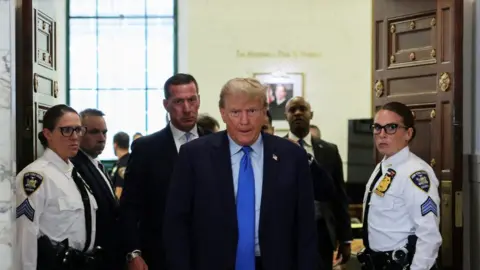Fact-checking Trump's claims about New York fraud trial
 Reuters
ReutersDonald Trump made a passionate opening statement, of sorts, on the first day of his fraud trial in New York.
The former president was not giving evidence - instead, he stopped just outside the courtroom to address reporters before the historic hearing began.
After a few stern looks at the camera, he launched into a lengthy preview of what his lawyers are expected to argue during the civil case again him, his two adult sons and the Trump Organization.
He also lobbed accusations against New York Attorney General Letitia James, who brought the fraud charges and is seeking a fine of $250m (£207m), and Judge Arthur Engoron who already ruled last week that Mr Trump and his business had committed fraud.
Let's take a closer look at seven of Mr Trump's claims.
1. There were no victims
This is very important to Mr Trump. He believes there should be no case because "there was no crime".
"No bank was affected. No bank was hurt," he said moments before the start of the trial, noting that all his loans were paid back on time.
Under this New York statute, however, the attorney general did not have to show that there were victims, only that Mr Trump committed ongoing fraud.
2. The case was timed to damage Trump's 2024 campaign
"This trial was railroaded and fast-tracked," the frontrunner for the Republican presidential nomination said. "This trial could have been brought years ago, but they waited until I was right in the middle of my campaign."
Mr Trump has cast this trial, as well as other lawsuits and indictments, as an attempt to hurt his bid to return to the White House next year.
But the investigation into these fraud claims began four and a half years ago, when Trump was still president, after his former fixer Michael Cohen went public with the Trump Organization's accounting practices.
Judge Engoron reminded Mr Trump's lawyer on Monday that the judge has already dismissed claims the lawsuit was politically motivated.
3. Trump was denied a jury
After the judge's ruling last week, Mr Trump made this claim in a social media post, suggesting to supporters that he had been denied a trial and a jury, and therefore robbed of justice.
On Monday in court, the judge made a point to say that "nobody asked" for a jury trial.
Bench trials are not unheard of, and it means the judge alone will decide liability and penalties in the remaining six claims.
4. The 'corrupt' justice department is behind this
To fit the case into his wider "witch hunt" rhetoric, Mr Trump claimed that Ms James was corrupt, and that she was coordinating with and taking orders from the US Department of Justice.
"It's all run by DOJ, which is corrupt, in Washington - everything goes through them," he alleged.
He has shown no evidence of coordination. Also, this is a civil fraud case based on New York state laws, not a federal one. The Justice Department has no jurisdiction here.
5. The 'buyer beware clause' renders contracts useless
Mr Trump pushed this rather unorthodox argument while speaking to reporters on Monday. His businesses' financial statements have a clause that Mr Trump calls a "buyer beware" warning, a disclaimer he said means "do not believe anything".
Mr Trump says that putting a "full disclaimer" in financial statements, "immediately takes you out of any fraud situation and any litigation".
But the judge was clear in his ruling last week that these are non-party disclaimers from his former accounting firm Mazars, and that they do not insulate him from liability.
Those disclaimers also plainly state that "Donald J. Trump is responsible for the preparation and fair presentation of the financial statement…"
6. The judge undervalued Trump properties
In an unusual step, the judge has already ruled that Trump properties were worth less than the former president and his company stated. That was part of a summary judgement delivered last week.
"What he did - undervaluing these properties - is a disgrace to our nation," Mr Trump said on Monday.
However, it was not Judge Engoron who came up with the valuations. The ones he cited in his ruling were from official assessors.
Take Mar-a-Lago, for example, the former president's Florida resort. It was the Palm Beach County assessor - not the judge - that appraised the market value of Trump's primary residence at between $18m-$27.6m (£14.5m-£22.5m).
Mr Trump continues to claim it is probably worth 50 to 100 times more.
7. Trump did not include his brand in his valuations
Mr Trump is not usually shy about telling the world how much his brand is worth.
In his comments before the trial, however, Mr Trump insisted it had not been factored into the valuations of various properties that are at the heart of this fraud case.
"My brand is extremely valuable. I didn't even use it in my financials."
The judge has refuted this, saying there is evidence that from 2013-2020 Trump's financial statements included a 15% or 30% premium based on the Trump brand for seven golf clubs.
On top of that, the judge ruled that the statements "double dip", by also suggesting that "the goodwill attached to the Trump name has significant value that has not been reflected in the preparation of this financial statement".
The trial continues and is expected to last several weeks.
